A disabled woman with a leak in her ceiling is unable to repair her home. Two Catholic sisters and a group of volunteers come by to offer friendship and fix the leak.
A retired mine worker, suffering from black lung disease, receives an electricity bill he cannot pay. He calls the electric company and a representative tells him to get in touch with a Catholic church for help.
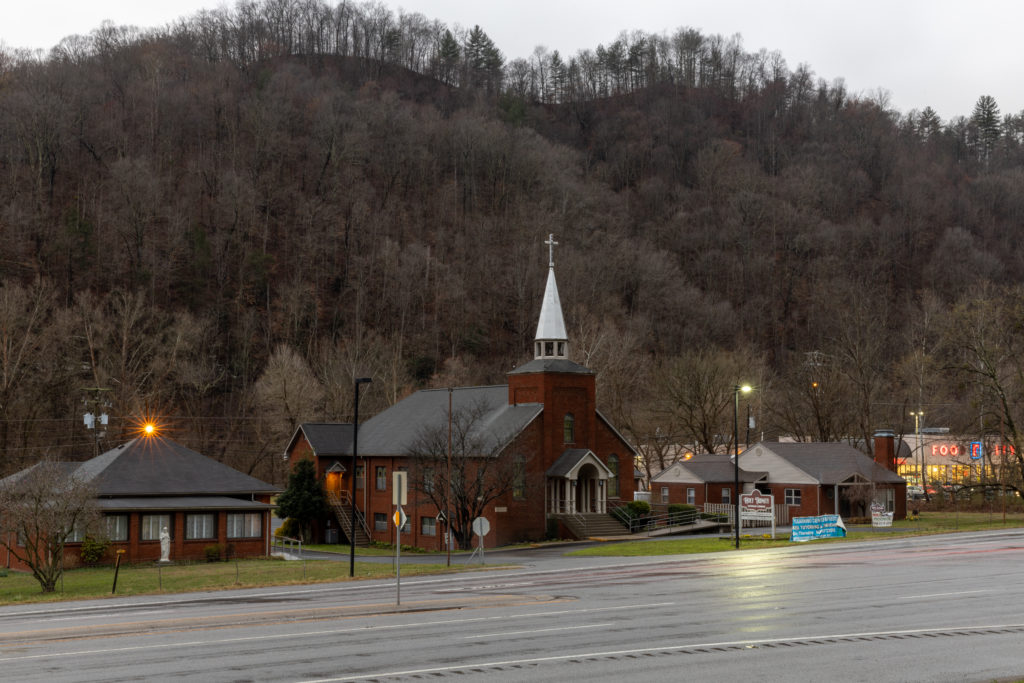
These scenes are common in eastern Kentucky, where many counties endure some of the most extreme poverty in the United States. The region’s towns, left in decline largely due to the departure of the coal industry, are populated with households struggling to access the most basic necessities— food, heat, medical care, safe housing and more. But that is not where the story ends. Where there is poverty, there is also generosity. Where there is human and economic frailty, there is also immense faith and a sense of purpose. People lacking material goods often have a surplus of love.
Although only a fraction of one percent of the population is Catholic in this region, a resilient network of Catholic missions serves their communities, embracing their challenges and their inherent beauty.
A small log cabin church with a big mission
In 1990 Catholic Extension Society helped build Holy Family Catholic Church in Booneville in the Diocese of Lexington, Kentucky. The charming log cabin church is nestled in a rare patch of flat land in the mountains. Inside, stacked among folding tables and in closets, are boxes and boxes of clothing, hygiene products and other household necessities.
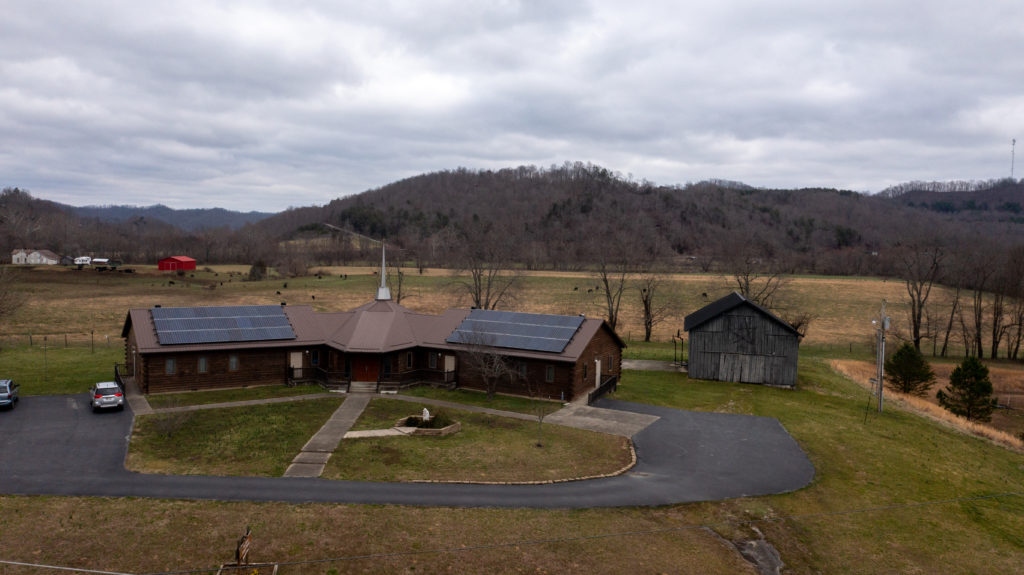
When Sister Marge Eilerman, a Sister of St. Francis of Tiffin, Ohio, arrived here in 1986, there was no church and only one Catholic person in the entire county. She turned an old smokehouse into a chapel and set to work reaching out to the community. People held misconceptions and misgivings about the Catholic Church’s presence, but through Sister Marge’s many years of ministry, she has become a beloved and trusted figure in town.
Sister Angie Kiel, also a Sister of St. Francis of Tiffin, joined Sister Marge 12 years ago. They live in a trailer next to the church, previously owned and gifted to them by Msgr. Ralph Beiting. The parish has grown to 17 families, most of whom are converts. Each week’s collection averages to about $5. This might seem incredibly insignificant until one comprehends the scale of the mission that takes place beyond the walls of this humble mountain church.
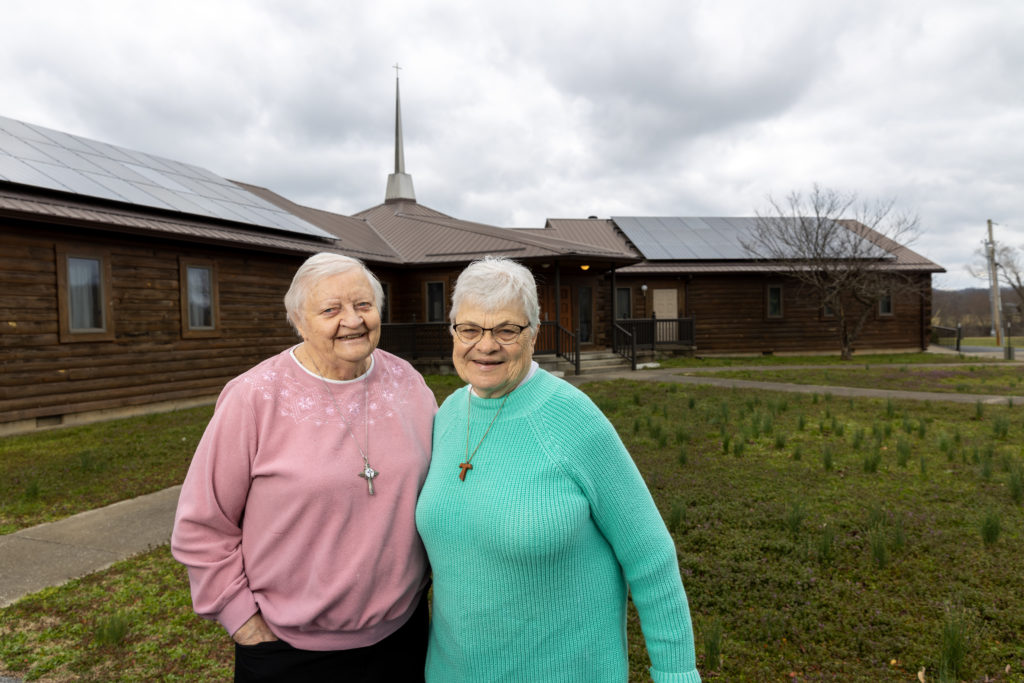
Under the leadership of the sisters, the parishioners of Holy Family have united with their community, which struggles with many hardships such as lack of employment opportunities and poor health. According to U.S. Census data, more than 35 percent of the population lives below the poverty line.
People regularly turn to the parish, which does everything in its power to help with both short- and long-term challenges.
The sisters have established a network of volunteers to assist with home repair. On such meager incomes, people have no money left over to fix leaking pipes or rotting floors, which are common problems in manufactured houses.
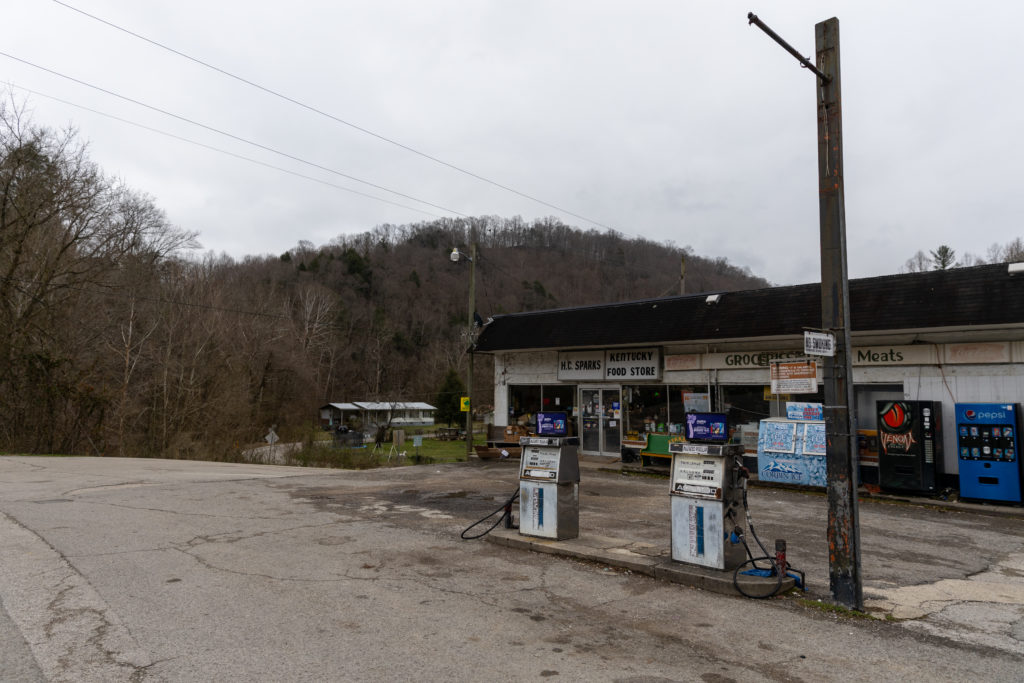
For example, volunteers built a wheelchair ramp for a disabled elderly woman using funding from Sisters on the Frontlines—a Catholic Extension Society initiative that offered emergency grants to Catholic sisters serving in poor regions across the United States during the pandemic.
More than just helping with the immediate needs of people, Holy Family takes a more wholistic approach to helping people by building relationships in the community.
“The outreach has been a part of helping people live a more dignified life,” said Sister Marge. “It is more than repaid by the beauty of the people here.”
“I like to serve here because the people are so honest and authentic,” said Sister Angie.
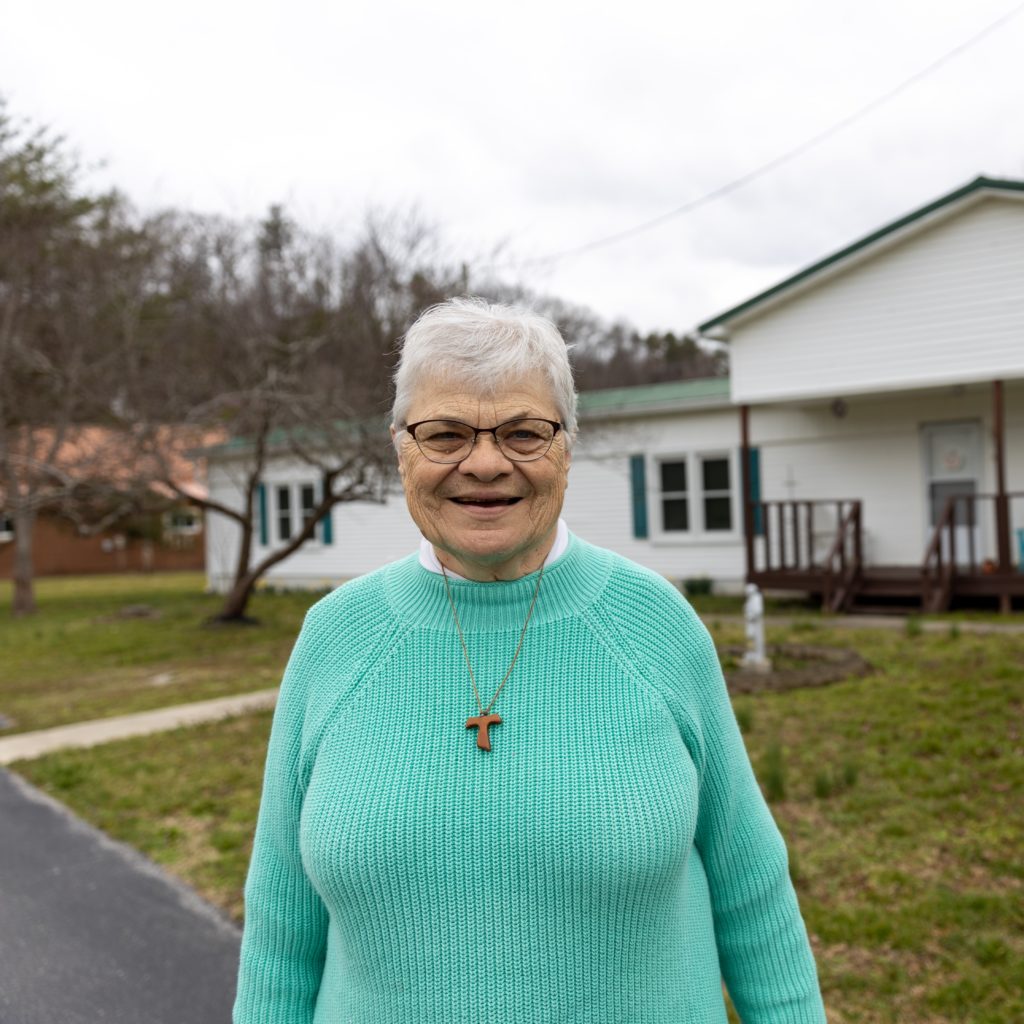
I really see the face of Christ in each person I meet, and that deepens my faith.
Sister Angie Kiel, OSF
No problem is off-limits. They helped one mother escape with her children from an abusive relationship. They paid the electric bill for a grandmother taking care of her two teenage grandchildren, who needed to use the computer to do their homework.
Each year during Christmas, the sisters set up a “store” that allows people, especially elders, to have their own private time to browse for much-needed items like soap, blankets, socks and more. Sister Angie said these community members tell her the experience makes them feel respected and dignified. “That brings the presence of Jesus to them,” she said.
Although most who visit the church are not Catholic themselves, they find solace within its log walls.
“The comment we get most frequently from people who visit the church here is that it is so peaceful. I think that’s something we all long for in our lives—to find a place where we can be at home,” said Sister Marge.
“The other asset that people frequently attribute to our small parish here is that of hospitality. Everyone is welcome,” she added.
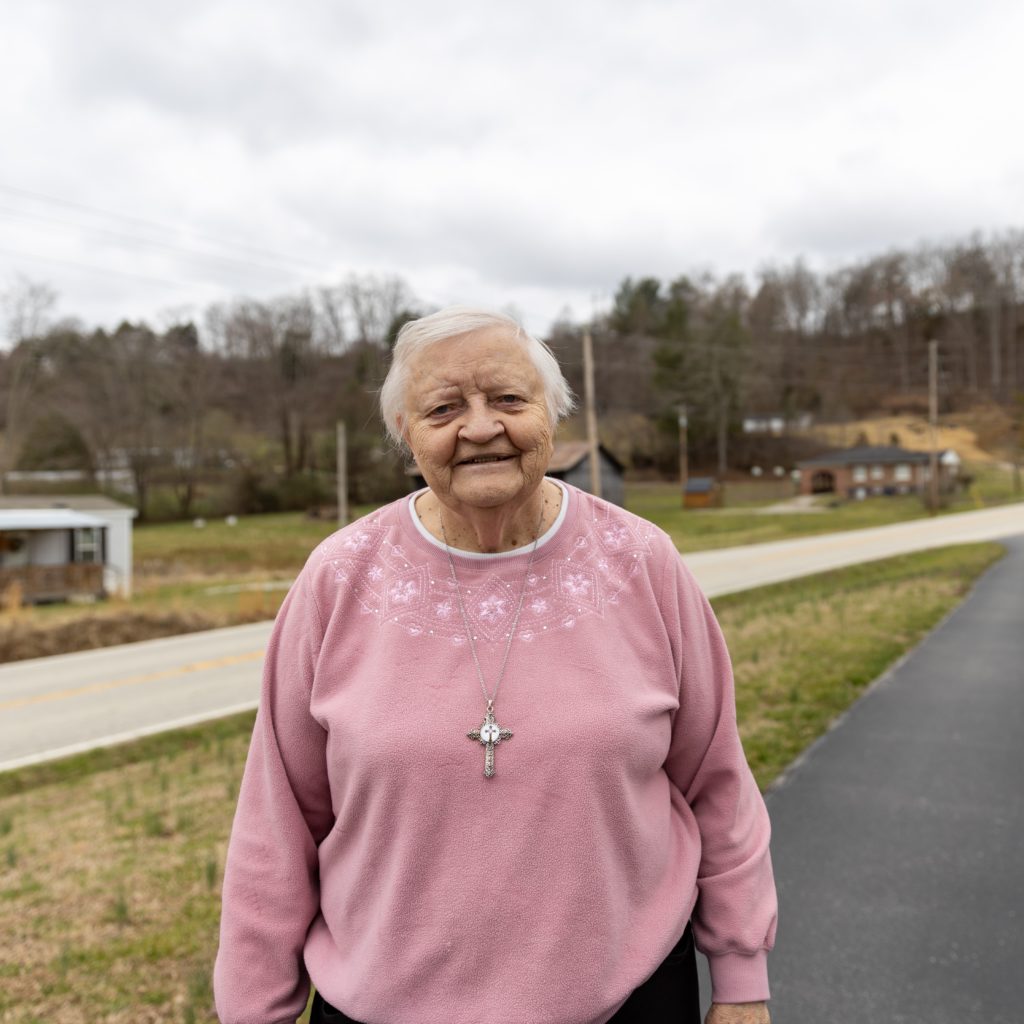
You are welcome as the person you are.
Sister Marge Eilerman, OSF
The Church community works hard to uphold Appalachian cultural traditions such as gardening and quilting by bringing the community together to pass along these teachings to the young people.
Those who do join the parish find spiritual fulfillment in their small faith community and through the sacraments. An eighth-grade boy joined their vacation Bible school. He said, “I’d like to become Catholic because I have a hole in my heart and I think Jesus is the only one who can fill it.” After he completed the Rite of Christian Initiation of Adults (RCIA), his mother chose to be baptized along with her two daughters.
The charismatic sisters and the hospitable Catholic community they lead have established long-standing relationships within and outside the community to help them in their mission.
God’s mercy in coal country
A two-hour drive south, Father Terrence de Silva leads faith communities and outreach in the heart of coal country. He is pastor of three churches: Holy Trinity in Harlan, St. Stephen in Cumberland, and the Church of the Resurrection in Lynch. Catholic Extension Society helped build Holy Trinity in 1949.
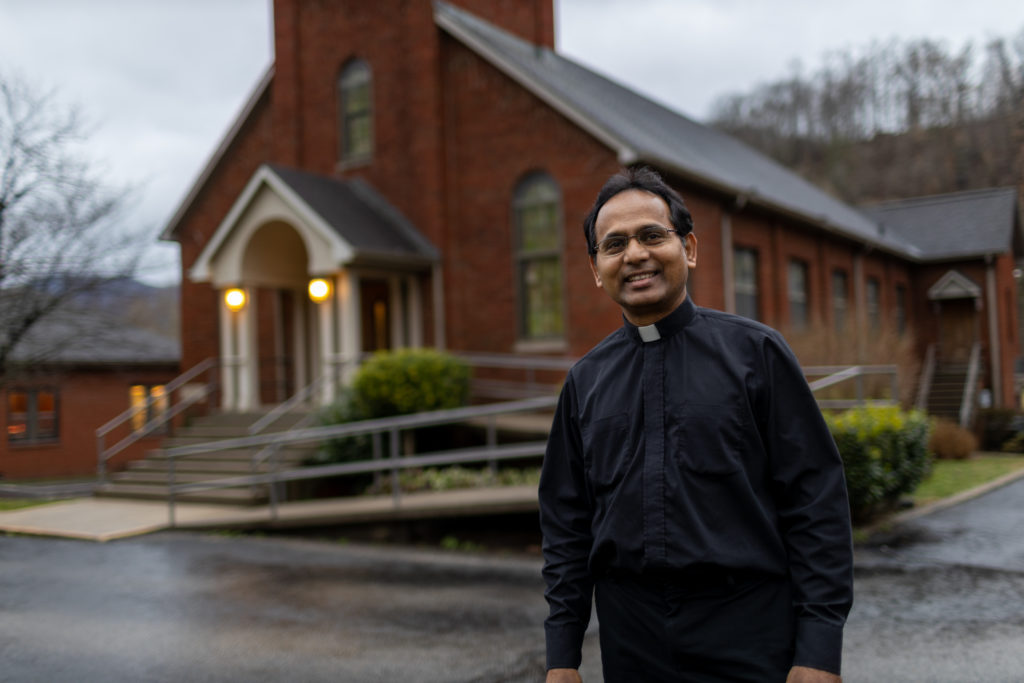
Father de Silva arrived in 2019, the first residential priest at Holy Trinity after more than 32 years. He found a small but determined faith community that had persisted all those years without a priest. The previous year, a blow struck the already struggling community when a coal company went bankrupt and did not pay out wages to its employees.
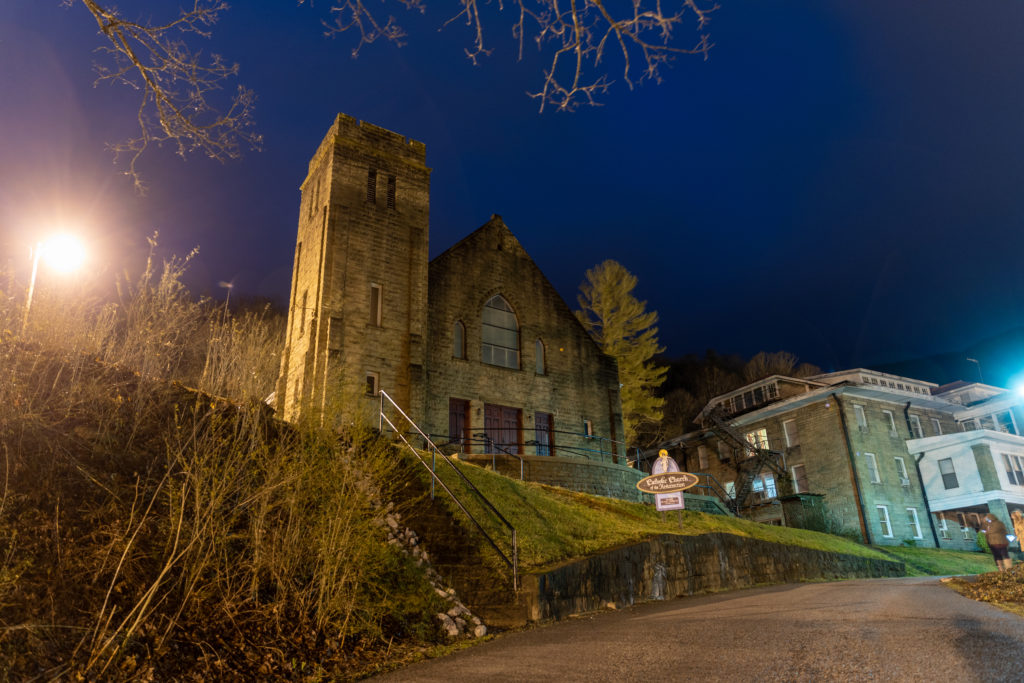
In the ensuing pandemic and declining local economy, Father de Silva has become familiar with the extreme need in the community. People often call the parish asking for help with food, clothing and bills. It wasn’t long after he arrived that he learned the electric company itself was telling people to contact the Catholic Church for help.
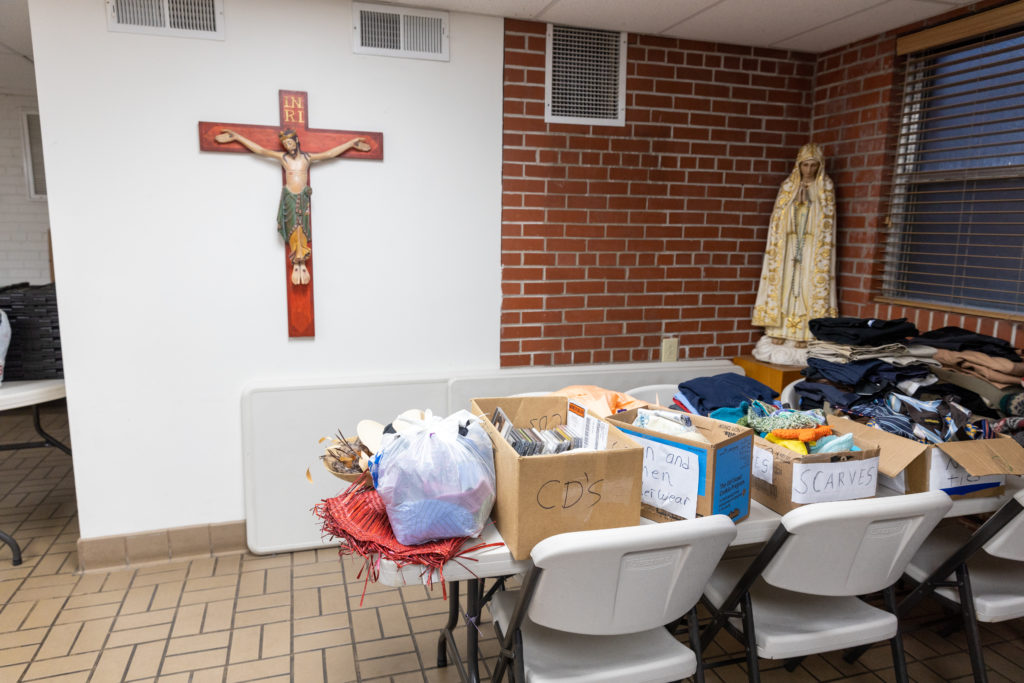
“This is what we have to do,” Father de Silva said. “Preaching is good. We have to let the people know what the Church teaches us and what Jesus has taught us. But we have to feed them first, right? Jesus did the same thing.”
The food pantry at St. Stephen is the largest in the county, distributing 600 boxes of food each month. People have said they would starve without it. The parish distributes food from Holy Trinity to about 50 families in the area.

The Holy Trinity property also contains additional school buildings, which are used for tutoring and preschool.
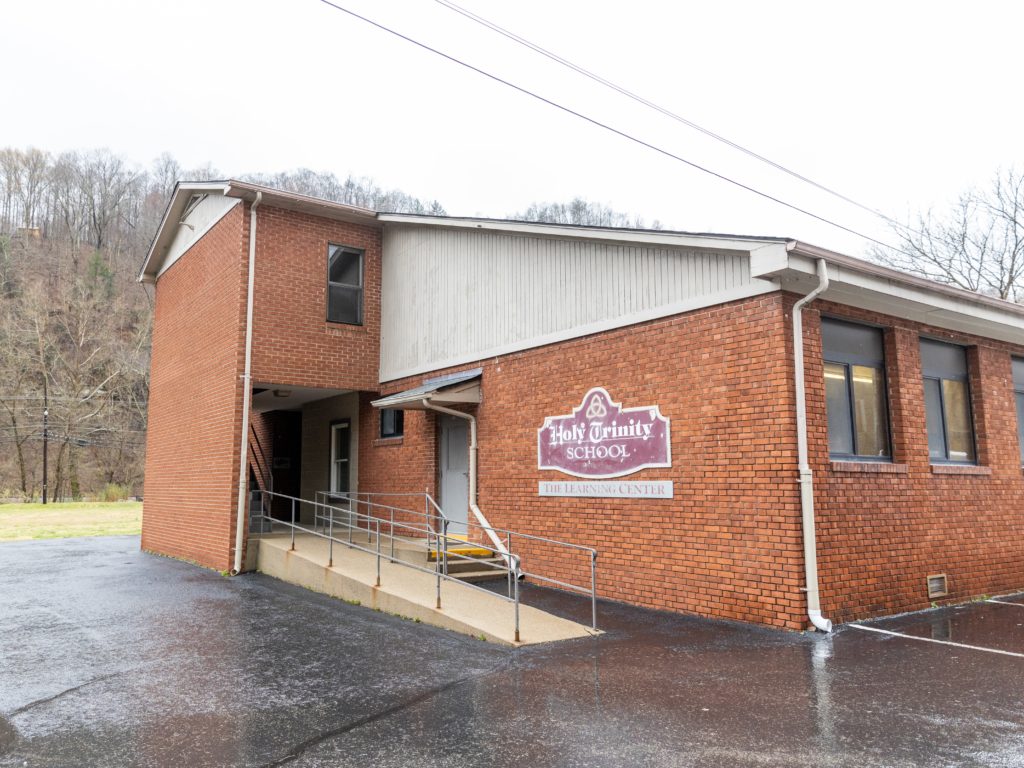
All of the instructors are certified teachers. These services are a beacon of hope for families in an area working to overcome decades of poor education. Recently, during the pandemic, many children have fallen behind in their schooling because the internet quality is so poor.
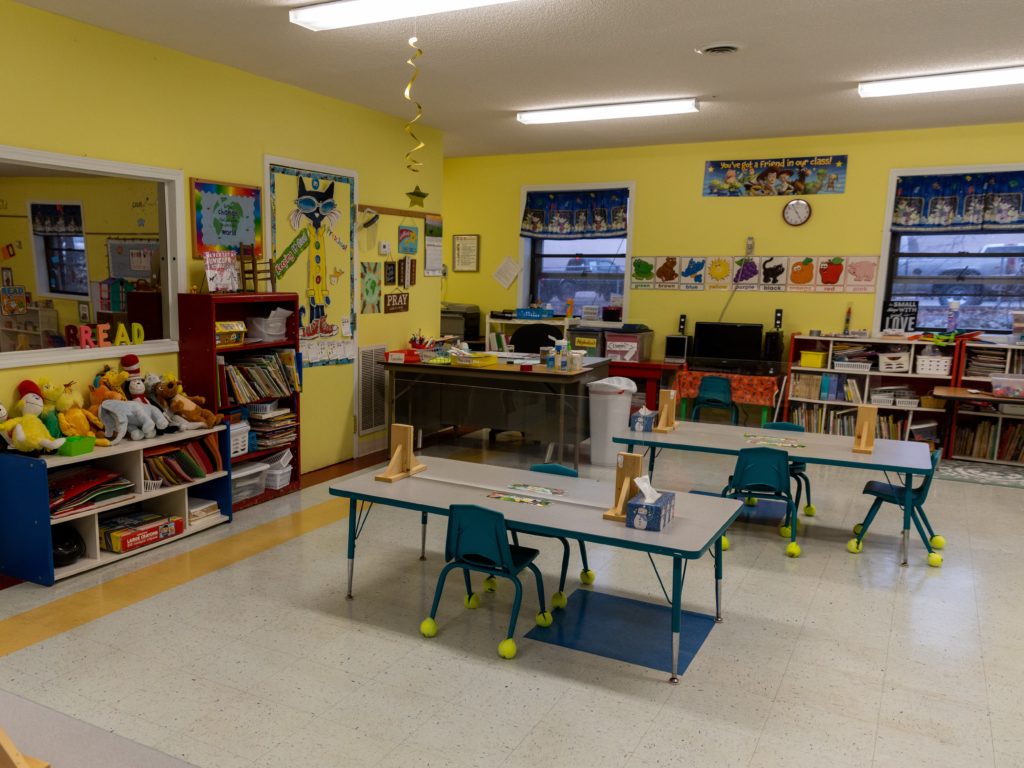
Trenna Cornett, the director of the program, has heard feedback from local schools that the preschoolers from the program are more prepared for kindergarten than any other children.
“It’s more than tutoring. It gets to be mentoring,” she said. “We have children who come back year after year, and we have seen kids from detrimental situations who have done well.”
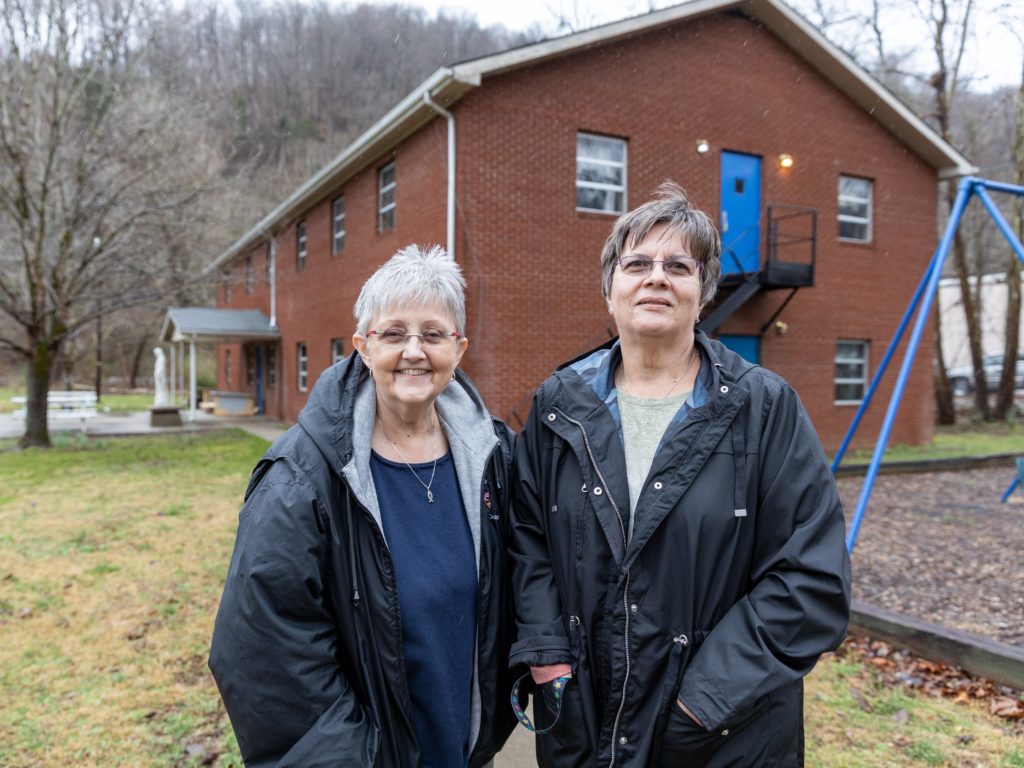
Sometimes, while he is driving between parishes, Father de Silva spots someone walking along the road. It can take seven hours or more to walk between the nearest towns. He’ll pull over, offer a ride and tell them to come to the church for help.
Mother Teresa’s legacy in Jenkins
At first glance, it might seem unusual that four Missionaries of Charity, in their trademark blue and white veils, would come to the remote mountains of Kentucky to carry on the mission of their foundress, Mother Teresa. They are vowed to serve the “poorest of the poor”—a category more commonly associated with developing countries. But anyone who knows the situation in Jenkins will report that these sisters are living out their vocation to the fullest extent.
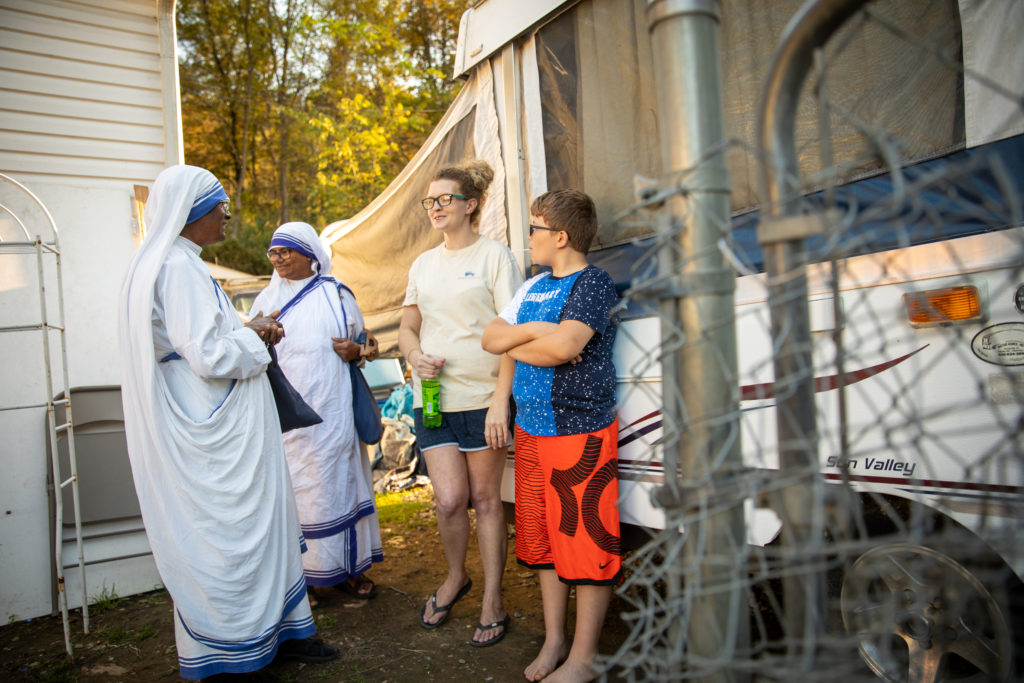
Sisters Sujaya, Drita Maris, Abelette and Donald live in a tiny convent without television, phones or washing machines, in accordance with their vow of poverty. Nearby is St. George Church, a quaint white chapel tucked into the hills. The parish they serve is among hundreds of poor faith communities supported by Catholic Extension Society.
In 1982 Mother Teresa visited to mark the opening of the convent and said,
Wherever the sisters go they become the sunshine of God’s love, the hope of eternal happiness and the burning faith of God’s love. Wherever they go that is all I pray for.
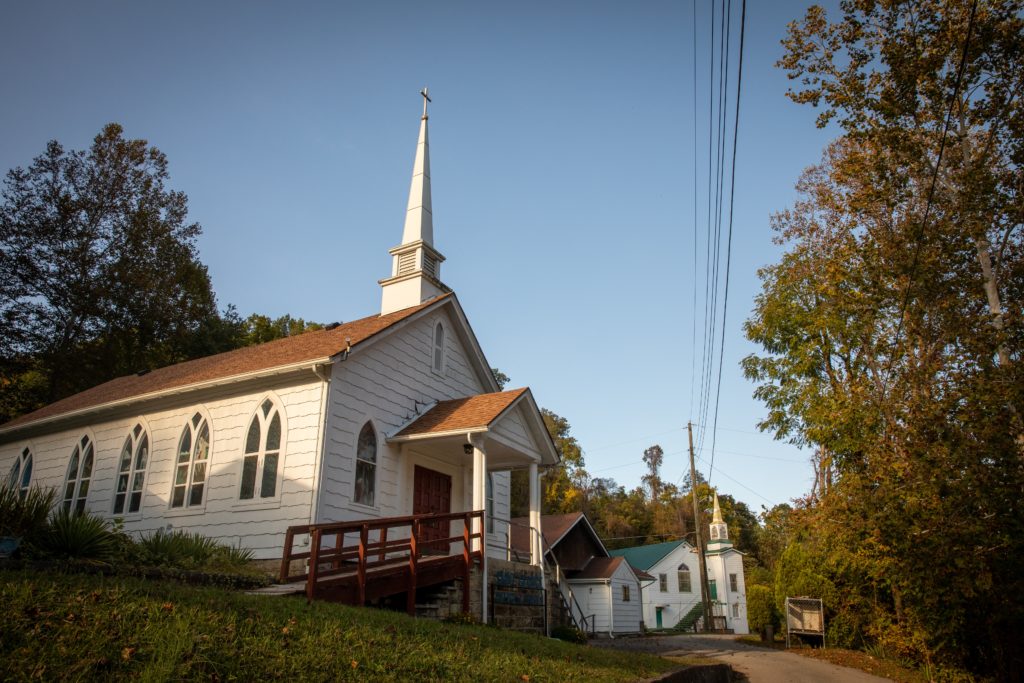
The sisters serving today are fulfilling these beautiful words of their foundress. They spend their days visiting houses and arranging the distribution of lifesaving supplies, bringing the mercy and love of Christ into people’s hearts and homes. They often find families, the elderly or the disabled surviving on the last crumbs of food or shivering in the cold and dark. The sisters once discovered an 81-year-old woman keeping warm with just a hair dryer. They quickly brought her a space heater.
These men and women in Appalachia who have committed their lives to serving God’s children express their profound joy in their work, regardless of its challenges. They know they are connected in mission with the countless individuals who send prayers and generous gifts, including those who support the mission of Catholic Extension Society.
Down in Booneville, Sister Marge has a message for them: “Thank you for all you’re doing for the people of the mountains.”
This article appears in Extension magazine’s summer 2022 edition, where you can read more stories on how Catholic Extension Society works in solidarity with people in America’s poorest regions to build up vibrant and transformative Catholic faith communities.


